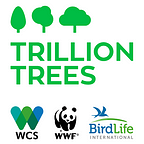Put People at the Centre of Forest Restoration
International Day of Forests, 21st March 2021
This year, the UN’s annual celebration of forests has chosen restoration, recovery and well-being as its theme. As humanity begins mapping its way out of the coronavirus pandemic, this is a most welcome focus. As with so much of nature, the world is finally waking up to the extent of our dependency as human beings on these complex, life-sustaining eco-systems.
Forests provide water, food, medicine and livelihoods to millions of people around the globe: 90 percent of those living in extreme poverty depend in some way on forests for income. Forests stabilise local weather and the global climate; they are critical to the fight against climate change. Their carbon absorption capacity is immense, with intact forests removing a quarter — 10 billion tonnes — of total global carbon dioxide emissions every year. And forest ecosystems are home to over half of the world’s biodiversity, and 80 percent of all biodiversity on land.
What is too often missed though, in the argument for restoring our forests, is economics: every $1 invested in restoring degraded forest generates up to $30 in economic benefits, including improved food production, carbon capture and water quality.
Yet, despite all this, we continue to lose our forests at a catastrophic rate. Nearly half of the six trillion trees that existed on Earth before the onset of agriculture have gone. In the last 50 years 420 million hectares of forest — an area two and a half times the size of Libya — has vanished. Ten billion trees are disappearing every year. Time is running out for forests, and for us.
This year, in the wake of the pandemic, our collective response to the crises that threaten our world — nature loss, climate change and economic insecurity — has become critically urgent. In June the UN will officially launch its ‘Decade on Restoration’, a rallying call for the protection and revival of ecosystems around the world. Throughout this year a series of global summits, culminating with the 26th UN Climate Change Conference in November, will set the agenda that will help shape our future and that of our planet. Clear direction and bold action must result from these discussions to protect and restore the greatest nature-based solution of them all: our forests.
Collective, sustained effort is crucial and, with the time left to us, the world cannot afford missteps. Tree planting and conservation at scale are necessary, but must be done in the right way; and alone they won’t be enough. The Trillion Trees partnership, grounded in science and with decades of experience, is focused on three core imperatives for trees.
First, to protect standing forests, which provide livelihoods for millions of people, and a home to millions more species. Second, to end the causes of deforestation, understanding that this means a change in our own consumer behaviour and financial incentives to succeed. Finally, to restore forests responsibly, allowing natural forests to regenerate themselves where we can, while making space for sustainable businesses around our forests.
In our Trillion Trees partnership, we talk about ‘forests that work for people, nature and the climate’. The order of these is important. The human desire for progress has led to the pressures that are destroying so many forests, so, as we fight to increase forest canopy, the solutions we choose must have opportunity and the well-being of people at their heart. The facts bear us out.
Cities such as Dar es Salaam in Tanzania, Rio de Janeiro in Brazil and Kuala Lumpur in Malaysia depend on neighbouring forests for water supply, food and the livelihoods of their citizens. Around the world forests directly provide more than 86 million ‘green’ jobs; 350 million people rely on forests for subsistence and survival; 60 million of these are indigenous peoples. These same indigenous people are too often denied fundamental human rights enshrined in so many global agreements as they struggle to defend their forest homes. As forests disappear, lives are eroded.
In contrast, thoughtful forest restoration programmes can not only help re-establish the great ‘lungs of the planet’, but also provide for countless communities — of all sizes — that live around forests and depend upon them.
In 2014 ten ambitious goals were set under the New York Declaration on Forests. These goals included halving deforestation by 2020 and stopping it by 2030, while restoring an area of degraded land larger than the size of India. It is clear that we are alarmingly far from achieving these targets. Governments and the private sector must act now to transform commitments into real action; to end deforestation and restore forests.
Our future depends upon it.
Patricia Zurita, CEO, BirdLife International
Tanya Steele, Chief Executive, WWF UK
Cristián Samper, CEO, WCS
